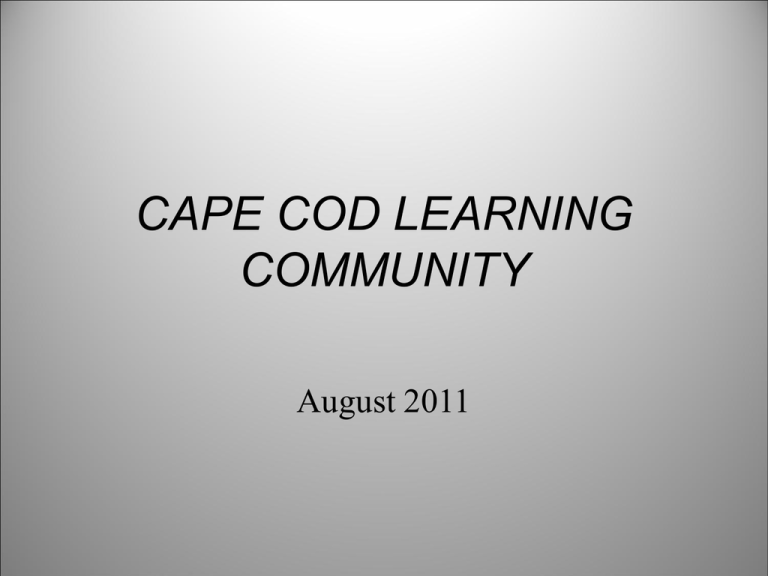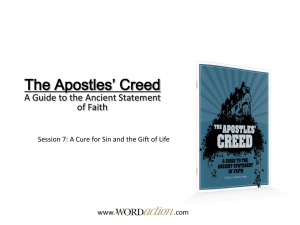Barbara Smith
advertisement

CAPE COD LEARNING COMMUNITY August 2011 Ever had one of these kind of days? Day after day after day after day after…………………… It’s time to stop the madness ! If we don’t take care of ourselves… NO ONE ELSE WILL ! In its August 2, 2010 edition, The New York Times published an article written by Paul Vitello, entitled… TAKING A BREAK FROM THE LORD’S WORK “The findings have surfaced with ominous regularity over the last few years, and with little notice: … Members of the clergy now suffer from obesity, hypertension and depression at rates higher than most Americans. In the last decade, their use of antidepressants has risen, while their life expectancy has fallen. Many would change jobs if they could.” “But while research continues, a growing number of health care experts and religious leaders have settled on one simple remedy that has long been a touchy subject with many clerics: taking more time off.” But God did! Genesis 2:1-3 “Thus the heavens and the earth were finished, and all their multitude. And on the seventh day God finished the work that he had done, and he rested on the seventh day from all the work that he had done. So God blessed the seventh day and hallowed it, because on it God rested from all the work that he had done in creation.” So I decided to do a little research! Set Them Apart The Self-Differentiation and Wholeness of Clergy Why? Mostly out of my own experience! I knew this was a subject on the minds of some, but little did I know just how many! 488 letters were sent to clergy men and clergy women inviting them to participate in a study I was conducting on clergy self-differentiation and wholeness. In those letters I enclosed a self-addressed, stamped return postcard on which respondents were to indicate their interest or disinterest. Blind survey percentage? By the time postcards stopped arriving, I had a total of 292 willing participants, and 25 who declined to participate. Rather than the 10% participation for which I had hoped, instead I had a 65% overall response, and 60% participation. What resources did I use? • Demographic Questionnaire – asked for a self well-being evaluation (1-5) and basic information since it was an anonymous survey • A Quality of Life Survey – 192 T/F questions covering 15 areas of life (including Material Well-Being, Family Relationships, Vacation Practices) • Burnout Inventory Human Services Survey And the results were… As I had expected, and affirmed and confirmed by the statistical analysis method, a clergyperson’s well-being is negatively affected by the negative aspects of his/her professional life and positively affected by the positive aspects of his/her professional life. Further, a clergyperson’s well-being is positively affected by his/her personal life. It would not, then, be out of line to suggest that a clergyman or clergywoman who has been positively affected by the positive aspects of his/her personal life has more resources with which to counterbalance the negative aspects of his or her professional life. Thoughts? How did we get here? Perhaps it is the result of psychosocial conditioning that the terms clergy and holy seem to be tightly intertwined. Psychologically, socially and theologically, we live in a world that does little to empower a person to be the person created by God in God’s image to give God glory. Rather, we hold one another to standards and models that may or may not be valid. So while we cannot hope to attain holiness as God is holy, we are called to “…lead a life worthy of the calling to which [we] have been called, . . .” (Eph. 4:1) We are not called to blend in with the crowd, but--as set-apart--to stand apart, in a healthy self-differentiated way. So while there is no single across the board answer to the question, “What is the biblical, psychological and sociological understanding of holiness?”, there is a constant theme of “different” and “differentiated.” Horror stories??? Rudolph Otto, in The Idea of the Holy, acknowledges that the words for holy in not only Hebrew and Greek, but also Latin, have taken on a moral and ethical connotation that the original language may have never intended. The words for holy in both the Old and New Testaments to have similar meanings spread across a wide range of subjects-from inanimate objects, to humanity and the qualities humanity should possess, to an attribute for the divine. In the Hebrew, the word for holy is qādôsh. The Old Testament holiness laws in Leviticus 11:44 mandate that the Israelites, God’s chosen, “. . . sanctify yourselves therefore, and be holy, for I am holy.” Greek: hosios vs. hagios • Used 4 times • Used 155 times • Referring to God’s resurrection of Jesus from the dead: “‘I will give you the holy promises made to David.’” (Acts 13:34) • • Paul to Timothy, “I desire, then, that in every place the men should pray, lifting up holy hands without anger or argument; . . .” (1 Timothy 2:8) • Under the NRSV heading which refers to Jesus, and which introduces Hebrews 7:11 with “Another Priest, Like Melchizedek” we read “. . . it was fitting that we should have such a high priest, holy, blameless, undefiled, separated from sinners, and exalted above the heavens.” (Hebrews 7:26) Defined by Friberg and Miller in their Analytical Lexicon of the Greek New Testament “as the quality of persons or things that can be brought near or into God’s presence holy; (1) of things set apart for God’s purpose dedicated, sacred, holy . . . (2) of persons holy, pure, consecrated to God . . . (4) superlative . . . most holy, very pure or sincere . . . as human beings belonging to God saints, God’s people, believers …” • Used to modify the Lord, who “. . . alone [is] holy.” (Revelation 15:4) hagios (cont’d) As an adjective modifying persons, hagios pertains “…to being dedicated or consecrated to the service of God . . .” (Danker) “. . . holy prophets from of old…” (Luke 1:70) John the Baptist as “. . . a righteous and holy man…” (Mark 6:20) “. . . Holy apostles . . .” (Ephesians 3:5) “. . . (as it is written in the law of the Lord, ‘Every firstborn male shall be designated as holy to the Lord’) …” (Luke 2:23) As an adjective modifying a thing, Danker points to Jesus’ teaching to the disciples “Do not give what is holy to dogs…” (Matthew 7:6) Paul instructs the Christians in Rome to greet one another “. . . with a holy kiss.” (Romans 16:16) Paul, instructing his early listeners and modern readers about the qualities to be found in one who professes Jesus Christ as Lord, urges them “. . . to present your bodies as a living sacrifice, holy and acceptable to God, . . .” (Romans 12:1) Paul in his letter to the Ephesians writes, “. . . just as [God] chose us in Christ before the foundation of the world to be holy and blameless before him in love.” (Ephesians 1:4) As such, the term holy, and the state which it suggests, has been included in our evolving definition and use in the same way that the negative human emotion we know as fear has been associated with the positive awe-full (as opposed to awful) nature of God. Rudolph Otto: holiness, rather than a way of life, comes from a deep-seated feeling and awareness of the Divine who alone is holy. Paul Tillich: “. . . whatever concerns a man ultimately becomes god for him, . . .” and “. . . only that which gives man ultimate concern has the quality of holiness.” However, Tillich cautions that objects should not be considered holy lest they become idols rather than icons which point to something beyond themselves. “The use of finite materials in their ordinary sense for the knowledge of revelation destroys the meaning of revelation and deprives God of his divinity.” Thus comes the danger of labeling an object, and yes--even a person--as holy. With the exception of only one person--fully human yet fully divine. When we consider ministry at Jesus’ command and in his name, it is neither too difficult nor too much of a stretch to buy into the concept of holiness as a hierarchical set apartness. That is exactly what happens in ordination, which for Otto is “ . . . ‘magical’ identification of the self with the [holy] . . . by . . . ordination, . . .” The ordained man or woman is labeled holy by association in the same way that today’s teenagers are many times judged by the company they keep or guilty by association. In Otto’s mind, the association is “. . . shown most strikingly in the name by which the company of the disciples call themselves collectively and each other individually, . . . the holy ones or ‘the saints.’” He does go on to warn that “. . . this does not mean ‘the morally perfect’ people; . . .” But it is not difficult to see from where the expectation has come even as C. Peter Wagner suggests in his book, Radical Holiness for Radical Living, “We can be holy, but we cannot be perfect.” He continues, using James 3:1 as his rationale, “The moment a believer accepts the role of a leader in the body of Christ, they move to a higher level of responsibility and accountability before God. . . . God evidently has a double standard of judgment, one for leaders and one for the rest.” As John Gammie (Holiness in Israel) considers the Priestly understanding of holiness, he holds forth that “Holiness demands separation. . . . The notion of separation is pervasive in the priestly traditions of the Bible from the Book of Genesis onward.” In addition, “The priestly theology of holiness strongly endorses clear differentiation between priests and laity . . .” and “The priestly writers of the Bible share with the prophets and sages the notion that God is holy and that holiness lays demands upon humankind.” Given the thought processes of Gammie and Wagner, is it any wonder that clergy men and women are falling off the pedestals they have been placed upon by their parishioners? Clergy should not be set-apart and elevated because of their calling, as much as they should be differentiated or set-apart in order to exercise the tasks of their calling. Moving to consider ordination theology and practices at the time of the Protestant Reformation of the 16th century, there was a clear move from the authority of the priest alone to the priesthood of all believers. If the relationship between Bishops and presbyters in the Apostolic Tradition could be considered collegial, that same relationship has turned more hierarchal with the passing of three centuries. The sixth century ordination prayer for presbyters includes language which indicates “. . . that the presbyters support the bishop in his ministry” as the high priest, in the same vein as the consecration of Aaron and the aforementioned elders appointed by Moses. Could this be the point of departure from being setapart as a matter of functionality, to being set-apart as a matter of status or privilege? But what still remains in some reformed traditions is “ . . . the ministry of the pastor being second in relationship to that of the bishop.” But it is more a functional separation than a hierarchical separation relating to differing degrees of set-apartness. As we then consider the concept of holiness as it relates to women and men ordained to the ministry of word and sacrament, has hagios been confused with the intention of hosios which, as defined by Friberg, means “generally, of what is sanctioned by the supreme law of God; (1) of persons who live right before God holy, devout, dedicated . . . ?” Have we ordained people to be hagios, holy only as God is holy--the same word used as a modifier of the third person of the Trinity and purely unattainable by human standards--when we really should be hosios? Have we taken hagios too far, such that clergy have set ourselves so far apart that we either adopt a form of misguided piety or have it assigned to us, such that we are pigeonholed into a position that our ordinations never intended? Self-Care Yet how do we turn the concept of being set-apart as an earned privilege to set-apart as that which includes responsibility--for emotional and spiritual self-care? Biblically, we have Jesus as a model. At various times through the Gospels, Jesus went away in order to distance himself from the frequent clamor for his attention. He sought time alone to pray. As a teenager, Jesus differentiated himself from his family in order to remain behind in the Temple. However, we also know that Jesus set the example, as well as the unattainable standard, for ministry in his name by being radically available. Dr. Margaretta Bowers suggests “The clergy suffer terribly from this need to be what they feel they should be, that they know their congregations expect them to be and what they know or feel themselves to be. They know their people expect them to be devout. They know they should be, and yet no matter how hard they try to find that inner sense of faith and security we call devotion, it eludes them. . . . All through the ages the clergy have suffered from the insurmountable contrasts between their very real humanity and the transcendent requirements of their symbolic representation as the priest, the Incarnate Christ.” Clergy may be set-apart for specific duties as a result of answering God’s call. But clergy are also living, breathing, sorrowful, joyful persons with a duty and responsibility to themselves as well as to the God who created and called them. They are also obligated to the congregations they serve to set and maintain appropriate boundaries and teach their congregants, if they aren’t already aware, of the critical nature of self-care. Appropriate and healthy boundaries, which include a realistic sense of self which “ . . . does not take him out of the common condition of the laity. . . .”, in addition to self-care and accountability, are critical to keeping clergy men or clergy women out of the news for engaging, or appearing to engage, in activity that has inappropriately taken advantage of another out of a misguided sense of power or set-apartness. Clearly, if we as clergy don’t take care of ourselves, no one else will. If health is indeed a balance of a person’s physical, emotional and spiritual self, it is entirely possible, and perhaps even probable, that an imbalance in one or more areas will affect a person’s homeostasis, causing boundaries to be crossed. Why then are clergy still challenged by a lack of selfdifferentiation and wholeness? In my opinion, Margaretta Bowers hits the nail squarely on the head when she suggests “Psychotherapy is accepted for the clergy in some sophisticated parishes in metropolitan areas; but in general, the immediate reaction to such an idea is that if they only prayed, they would be all right.” The denial of self must stop. “[A] . . . self focus is different from being self-centered or selfish. A self focus allows us to be objective enough to develop a sense of our own responsibility and direction in the community.” A self focus is another way of saying a pastor must be self-differentiated. We as clergy have a responsibility not only to our congregations, not only to ourselves, but to our God who created us, to engage in self-care. Michael Cavanagh would seem to agree when he writes, “Like all Christians and all human beings, ministers have not only the right but the responsibility to celebrate their selves and to take proper care of them, both for their own welfare and the welfare of others. It is virtually impossible for a minister who attends properly to his or her self to experience burnout or other psychological problems... One need only look to Jesus . . . to see that there is good precedent for proper attention to the self.” Have we as clergy taken it upon ourselves to--in effect-one-up God by failing to take seriously the concept of selfcare, which Genesis would call Sabbath rest? If we firmly believe that our body is a “. . .temple of the Holy Spirit . . .” (1 Cor. 6:19) as Paul writes, then we can do no less than intentionally engage in Sabbath keeping which acknowledges “ . . . a faith system that recognizes the pervasiveness of God’s holiness in everyday life experiences.” To deny one’s self the opportunity for the Sabbath rest that God deemed good is to deny the power and presence of God. In so doing we, in effect, demonstrate a mindset that God can’t manage the world God continues to create day by day without us. “. . . one key ingredient that pastors who survive a crisis healthily share in common—that is, these clergy have persons with whom the relationship is deep and trusting enough to allow the kind of brutal honesty that can turn a person from wallowing in self-pity or self-destructive behaviors.” “Whether by neglect or assumption that it naturally happens, self-care for clergy has often not been on the front burner of the church’s agenda. But in this study the pastors who have survived a ministerial crisis reported significant attention to and reliance on self-care.” Craig Boehlke “If you could go back in time, how would you rearrange things to avoid having a breakdown? Could it have been avoided by a different organizational structure?” Stefan Ulstein, in his book, asked those questions straightforwardly to an interviewee in a chapter entitled, “I Felt My Life Had Been Thirty-Two Years of Fraud.” The answers were telling. “Maybe. If I’d had some kind of genuine support system to make me slow down, ask questions, avoid giving pat answers to tough questions, maybe it would have been different. Maybe if I’d examined psychology instead of just relying on God talk, I might have understood what was happening to me. . . . When we see that things aren’t fitting together like they should, we reduce input and options as a way of protecting ourselves. That was my problem. I knew from the lives around me that things weren’t as simple as I wanted them to be, so I just worked harder, ran faster and ignored what I didn’t want to see. I paid a terrible price when it all caught up with me.” Stefan Ulstein, Pastors Off The Record: Straight Talk About Life in the Ministry (Illinois: InterVarsity Press, 1993), 39. Men and women who have answered God’s call to Ministry of Word and Sacrament long to be freed of the statement, “Clergy are often challenged by a lack of selfdifferentiation and wholeness.” And it IS within their power. Write your own creation story from the perspective of a normal week for you. Is there a seventh day of rest? Is your story life giving or life draining? WHAT TO DO? Peer Groups CPE Model Individual Therapy Spiritual Direction Coaching Mentors NOODLING








